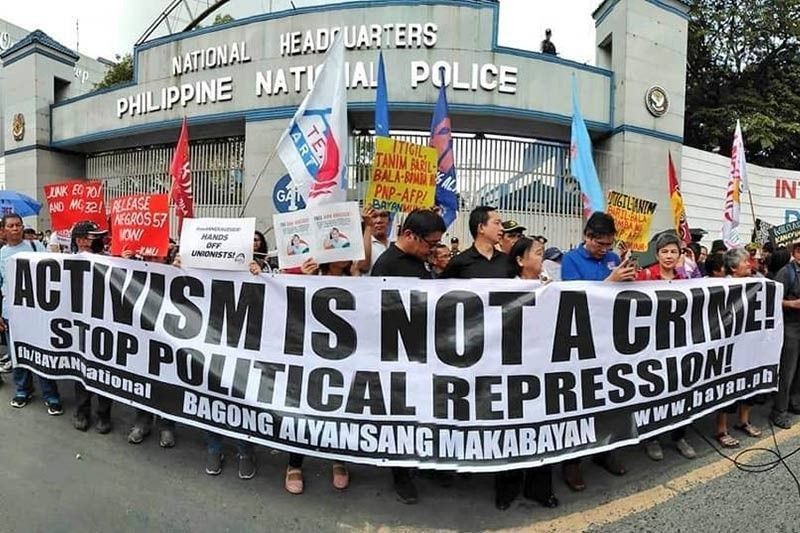Search warrant from QC that led to arrest of BAYAN activists in Bacolod quashed

MANILA, Philippines — A Bacolod City court has quashed the search warrant issued by Quezon City Judge Cecilyn Burgos-Villavert that led to the arrest of several activists in Bacolod in 2019.
In a statement, NUPL Panay Chapter said the Bacolod City Regional Trial Court Branch 42 granted the Motions to Quash Search Warrant and Suppress Evidence filed by Karina Mae De La Cerna, Cherryl Catalogo and John Milton Lozande.
It added that similar motions were granted in the cases against Proseso Quiatchon, Albert De La Cerna and Noli Rosales.
NUPL Panay said the accused were arrested following the police’s implementation of search warrants issued by Villavert in the office of Bagong Alyansang Makabayan (BAYAN) in Bacolod City. They were charged with violation of Comprehensive Firearm and Ammunition Regulation Act — one of the common cases filed against activists that have kept them in jail.
READ: Amid Bacolod arrests, SC reminds justices to 'be prudent' in issuing warrants
In resolving their motion, Acting Presiding Judge Ana Celeste Bernad ordered the quashal of the search warrant over “non-conformity with established constitutional rules and the evidence.”
This is the second reported nullification of search warrant issued by Villavert. The Mandaluyong court in February declared as void the search warrant that was implemented and led to the arrest of Manila Today editor Lady Ann Salem and trade unionist Rodrigo Esparago.
Although state prosecution blocked their release following the nullification of the warrant, Mandaluyong RTC 209 Presiding Judge Monique Quisumbing-Ignacio granted their motion for release.
“[A]fter thorough consideration of the arguments raised and jurisprudence cited in Salem's comment, the court resolves to reconsider and rule that a trial court is empowered to immediately release the accused if the evidence on record clearly fails to establish probable cause," the ruling read.
Search warrant lacked particularlity
In the case against the Bacolod activists, the court said the search warrant failed to “describe the place with particularity,” as it noted that it only identified one place but upon their ocular inspection, there are three structures in the compound.
The court stressed that the validity of search warrant does not only rest on probable cause as determined by judge upon application. “[I]t is essential too, that it particularly describe the place to be searched, the manifest intention being that the search be confined strictly to the place so described,” it said.
The court noted that in the case against BAYAN members, “it would seem that the warrant gives the raiding team unbridled and thus illegal authority to search all the structures found inside the above-stated address.”
The document stated that the prosecution argued that a sketch map and pictures of premises to be searched were attached when they applied for the search warrant, but the court said these were not made “integral.” That the raiding team knew which structure supposedly contain the firearms and ammunitions also “did not justify the lack of particulars of the place to be searched.”
“There was therefore in this case an infringement of the constitutional requirement that a search warrant particularly describe the place to be searched; and that infringement necessarily brought into the operation the concomitant provision that the Constitution guarantees the right of the people to be secure in their persons, houses, papers and the effects against unreasonable searches and seizures,” the court said.
This latest quashal of search warrant from Quezon City comes at a time when lawyers and progressive groups are pressing the Supreme Court to look into courts that they said have become “factories” for search warrants.
A 2004 SC circular authorizes Manila and Quezon City courts to search warrants that may be implemented anywhere in the country, “in certain instances and provided that the legal requirements are met.”
In the wake of “Bloody Sunday” raids in Calabarzon, rights lawyers urged the the SC to put “safeguards” in this circular and called on judges to be “more circumspect and thoroughly vet applications for search warrants” as there have been anomalies not only in the implementation but also in the application for them.
- Latest
- Trending

































